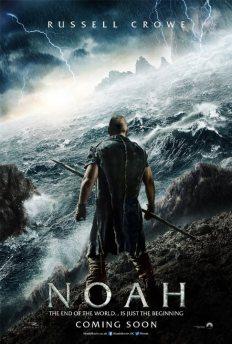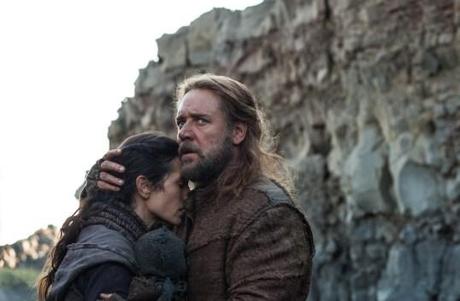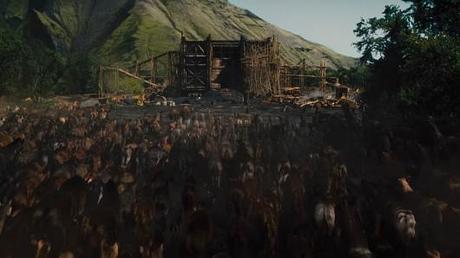 Directed by: Darren Aronofsky
Directed by: Darren Aronofsky
Starring: Russell Crowe, Emma Watson, and Ray Winstone
Plot: In a world run rampant with sin, Noah is given the task to create an arc to survive the destruction.
Review:
When the news finally reached the general population that auteur Darren Aronofsky was adapting the tale of Noah, people had a problem with it. The religious were concerned it wouldn’t be pious enough, while the atheists (or should I say anti-theists) were worried about a boring Biblical epic being crammed done their throats. Fortunately, the tale of Noah has definitely gained a broader appeal becoming something more like a fairy tale than an Old Testament parable, and Hollywood has been plenty interested lately in reimagining fairy tales as Tolkien fantasy epics.
This one has all the elements including characters with horrible names (Ham?), barbaric hordes, and a grand wizard to name a few. There are even these giant CGI rock monsters (who are actually fallen angels) who look like they were animated with stop-motion clay, in a good way, hearkening back to the Harryhausen days of fantasy epics. The most interesting thing about it though, and is something I don’t think I have ever seen in the fantasy genre before, is it is an end-of-the-world movie. We usually expect to see these kinds of movies in the science fiction genre taking place sometime in the future, whether tomorrow or decades from now. Or we expect them to be after the devastation looking at our contemporary world broken and fallen apart. Instead, Aronofsky looks at a time before ours making it kind of refreshing.

I have been looking forward to it for quite some time, not because I am religious or really all that interested in Hollywood’s fairy tale reimaginings, but because I am a huge fan of Darren Aronofsky. He is a creative force behind the camera making stunning portraits populated by amazing actors (many of whom give career best performances). He isn’t afraid to wade into darkness and is clever enough to study “human obsession” over and over making it feel like a brand new subject each time. Whether it is one ballerina’s quest for the perfect dance or a wrestler holding on to the only thing that gives his life meaning, the character study of Noah is in good company among Aronofsky’s filmography.
Russell Crowe is cast in the lead in a role he was born to play: one part brute, one part scholar. He speaks with eloquence, but he carries a big stick. Crowe plays him with as much nuance as he can possibly muster, but the demands of the narrative force Noah to be a pawn in his own story. Noah is essentially strapped in and forced to go on the ride of fear and guilt, as he shamefully puts aside his natural protector side to live up to God’s (or as they refer to him, The Creator’s) desires. Unfortunately, Aronofsky often times feels tied down by these same demands, as well. The great flood is not a climatic end point but an event that happens closer to the middle. He has always described his version as a story about survivor’s guilt, and when it is time to send Noah on a downward spiral, the tone changes dramatically. It turns into more of the character piece it was always meant to be, losing a lot of the sword-and-sandal aspects that made it an exciting blockbuster in the first place.

Nevertheless, I found Noah to be a thrilling experience. Aronofsky successfully repurposed Noah as a more tragic character like Abraham or Lot rather than the Biblical superhero most children are taught. Those who invest in Crowe and Aronofsky’s version of the character (and by extension the parable about the dangers of blind faith) will swiftly move past the tone change. Both the religious and the non-religious should have no worries either. As far as perceived agendas, the movie offers more insight than answers. The movie ends just as conflicted as it starts, maybe more so, and it blurs the line between divine providence and fantastic magic, allowing it to be interpreted as both sermon and fiction.
Rating: 8/10

